Welcome to another issue of The Newport Cornucopia where we dig through the newspapers archives for interesting news articles and adverts. All articles are posted verbatim and most headlines are original (headlines in quotes are my own).

Pont Ebbw Mill
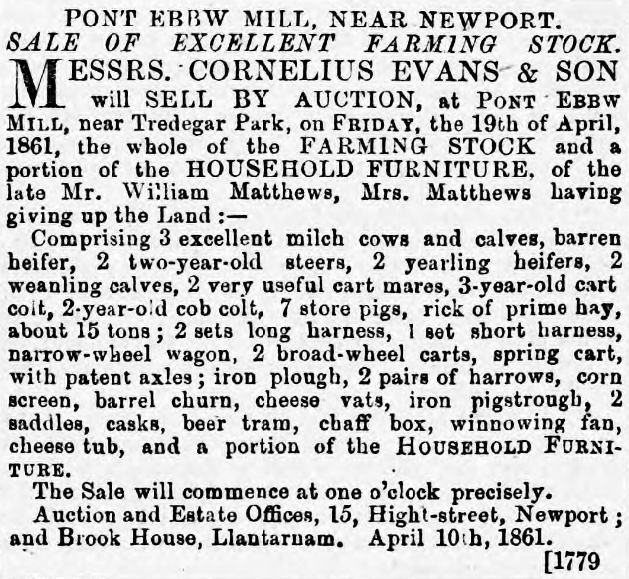
For Sale in 1861 was a large selection of farming stock and household furniture of Pont Ebbw Mill. The mill was there in 1840 when the tithe map was drawn up and is still there today alongside the SDR.
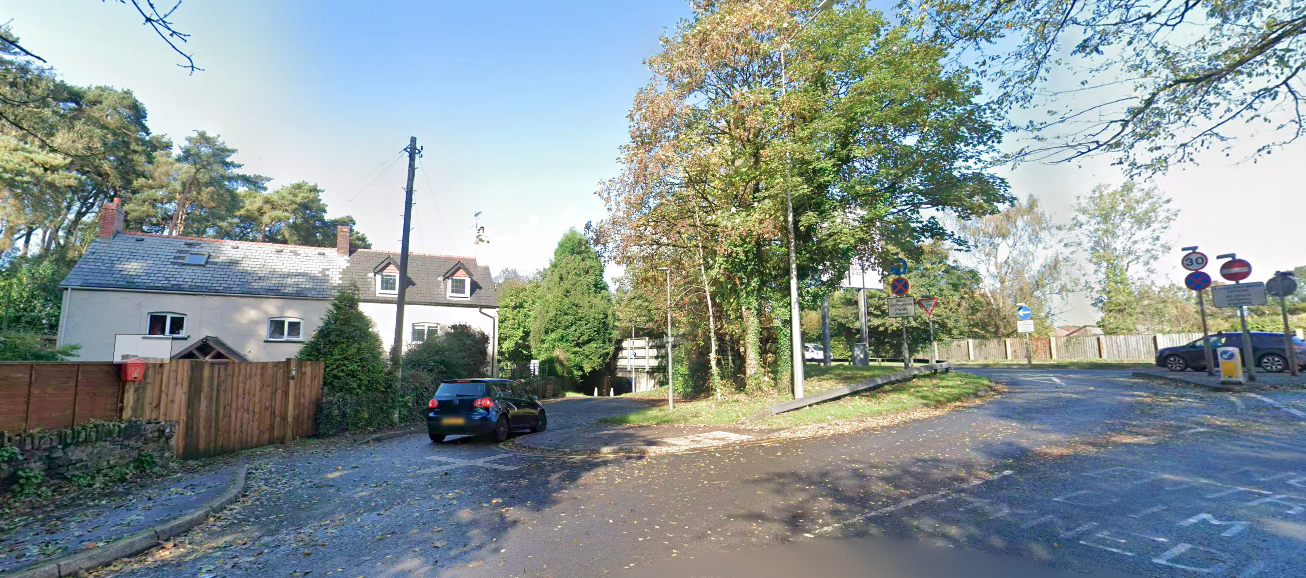

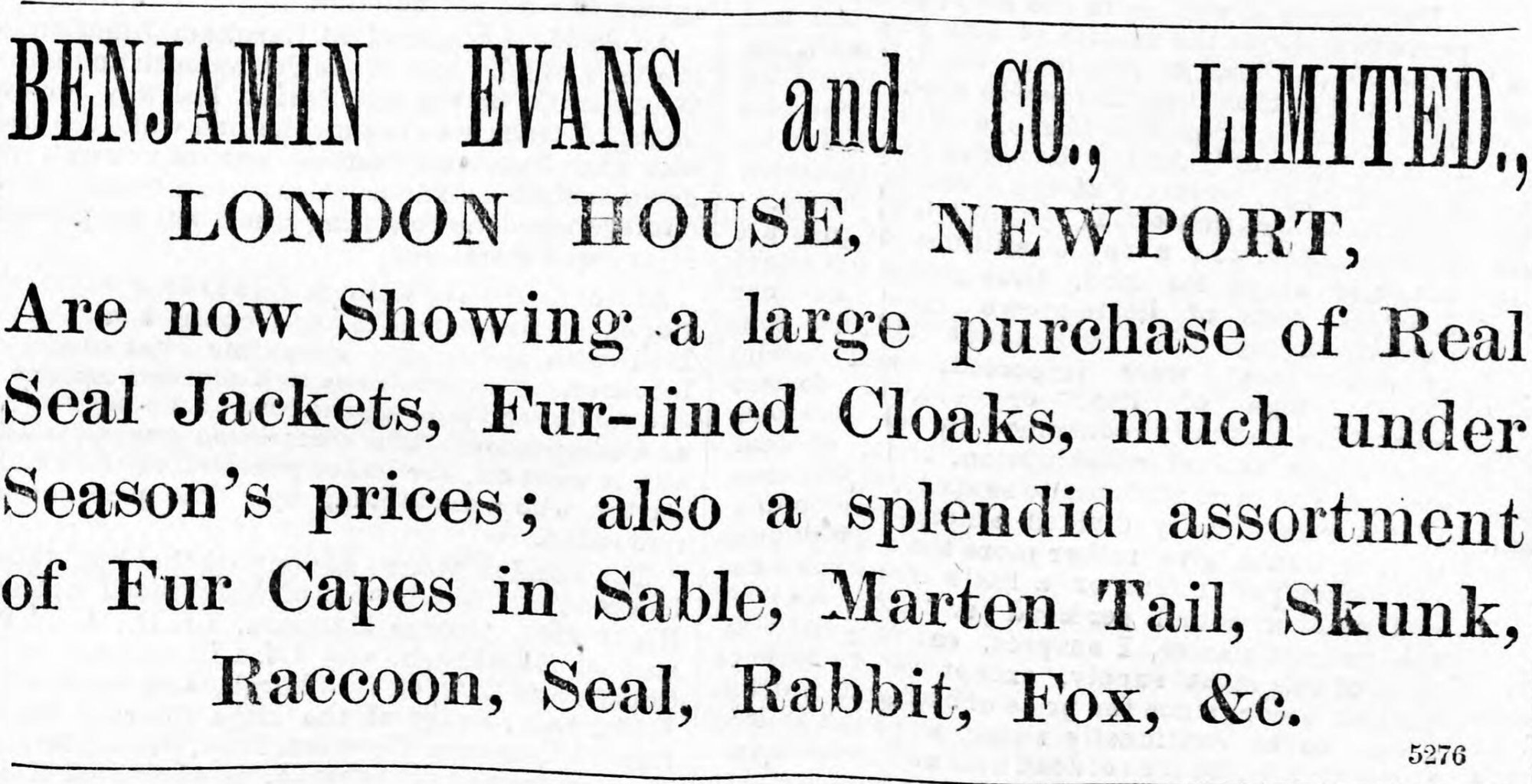

A Melancholy and Fatal Accident
We regret to have to record a melancholy occurrence, attended with a fatal result, which took place in this town on Wednesday last. It appears from the information we have received that the unfortunate deceased, who had been for some years a servant of Mr. Moses Scard, of this town, was, on Wednesday, sent by his master with a cart-load of beans to Ebbw Mill, on the Cardiff-road and on returning to Newport, whether from been incautiously riding on the shafts of the cart, or from any other circumstance, is not yet known, he fell under the wheel, and the cart passed over the middle of his body, which was shockingly crushed, and the spine was completely broken.
The unfortunate man was immediately removed to his own house, and was placed under the skilful treatment of W. Brewer, Esq., surgeon; but the injuries he had sustained were irreparable,—he died in a few hours after. The deceased was about 38 years of age, and was a man of sober and industrious habits. He has left a widow and three destitute children.
— Monmouthshire Merlin, 20th September, 1845

'For Sale: Farming Stock at Ty Llwyd Farm'
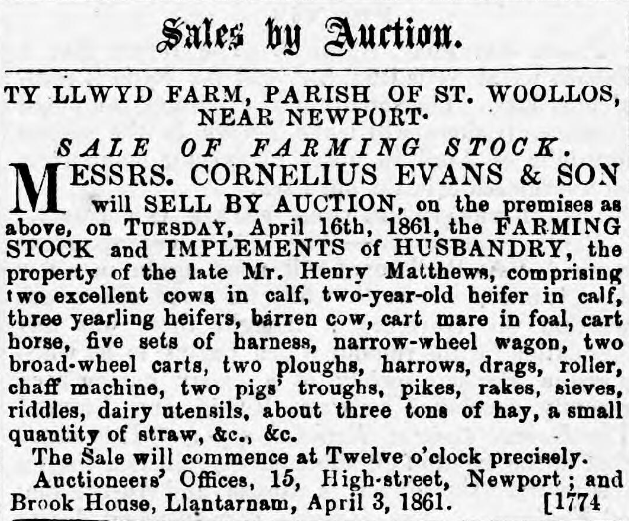
For sale in April 1861 was farming stock at Ty Llwyd Farm which was located in the Ridgeway area of Newport. The farm is long gone and according to the tithe map the late Henry Matthews who occupied the farm also had quite a bit of land in the Ridgeway area.
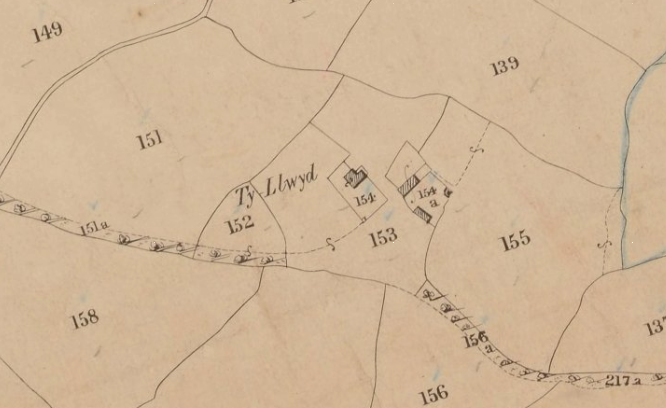
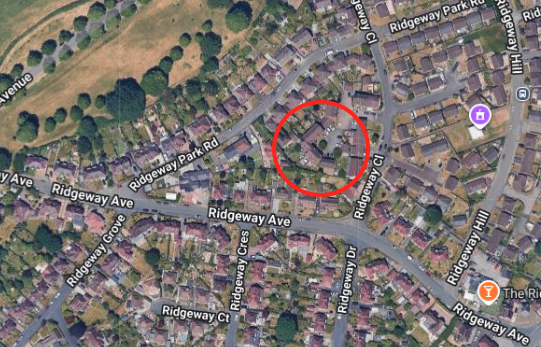

'The Snake Dancer'
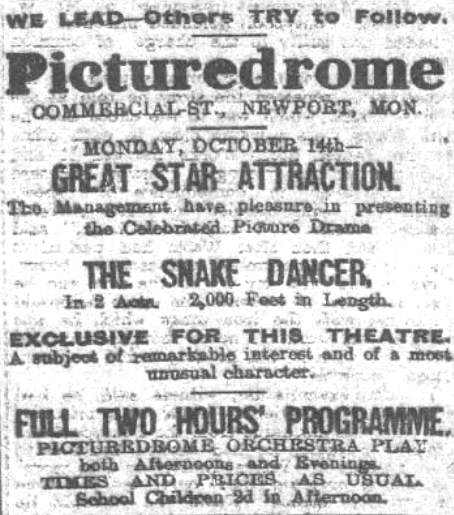
The Snake Dancer was a 1912 Danish silent film by Alfred Lind, also known as Bjørnetæmmeren (The Bear Tamer). It tells the story of a bear tamer who joins a traveling circus and marries a snake dancer.



Publicans' Offences
William Tucker, of the South Wales Railway Inn, Baneswell, was summoned for having persons in his house on Good Friday afternoon. No beer was found by the policeman.—The defendant said one of the parties was a man who was ill, and had dropped in to rest himself; the other was a boy waiting for the train.
The Rev. Thomas Pope: You must pay the expenses. Another conviction will, I am afraid, deprive you of your license.
Ebenezer Williams, Liswerry, was ordered to pay costs, his house having been found open at an illegal hour.
William Brain, of the King of Prussia, Christchurch, was summoned for supplying beer during divine service on Good Friday. Defendant acknowledged that his wife did supply a man with a glass of gin and water at the door; but the policeman said a man and woman were inside. To pay costs.
Samuel Berry, Christchurch, was charged with permitting drinking in his house on Palm Sunday morning. The individual seen there was, it seemed, a man who had walked five or six miles to flower graves, and bad got wet through.—Case dismissed.
— Monmouthshire Merlin, 13th April, 1861
'Dos Works Lads'
Five of the Dos Works lads were charged with throwing stones in the streets, —thereby considerably damaging the doors of certain dwellings in the neighbourhood of Baneswell.—Inspector Williams said the conduct of the boys employed at the Dos Works, when returning from their work at an early hour in the morning, was a source of continued annoyance; and that the only way of dealing with them was by summoning them before the magistrates, the parents taking offence if the police inflicted summary chastisement.
Mr. Fox said the practice was very dangerous to passers by Mr. Watkins, of Stow- hill, said that damage to the amount of 30s. had in this way been done to his property; but he was not prepared to say that the offenders were the boys now charged.
Alderman Evana remarked that it was rather a difficult matter upon which to adjudicate. He did not wish to send the lads to prison. It was not to be supposed, however, that the property of the town was to be left to their mercy; and he thought the most advisable way would be to give each of them a whipping.
Hoping that such a course would be taken by their parents, he should inflict upon each a fine of 1s., at the same time cautioning them that future offenders would certainly be dealt with more hardly, as they rendered themselves liable to a penalty of 40s.
— Monmouthshire Merlin, 20th April, 1861
'Trespassing in Christchurch'
William Small was summoned for committing a trespass by walking over some garden ground, belonging to Henry Buckler. The defendant said he done no injury, and was afraid to turn back, the defendant's brother was threatening him so strongly. Ordered to pay the expenses 4s.
— Monmouthshire Merlin, 27th April, 1861
'Not Drunk, Only Stupefied'
Thomas Pollard was charged with a like offence [being incapably drunk] on Caerleon-road.
Defendant said he was "not drunk, only stupified; having drank but a shilling's worth of brandy and a pint of beer during the day."
Ordered to pay the costs, 6s.
— Monmouthshire Merlin, 27th April, 1861
'Throwing a Stone at a Sister'
Alice Whitson was charged with assaulting Mary Smith, at Pillgwenlly, on Saturday, by throwing a stone at her. It appeared that the parties are sisters, and complainant owed defendant a small sum of money, the nonpayment of which was the cause of the quarrel. Case dismissed.
— Monmouthshire Merlin, 27th April, 1861



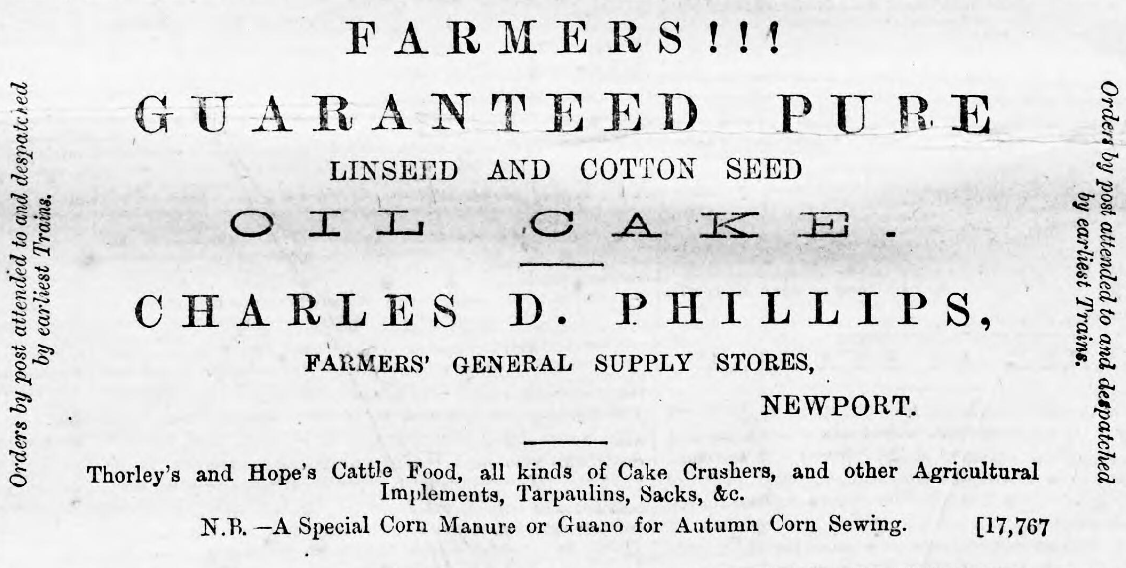



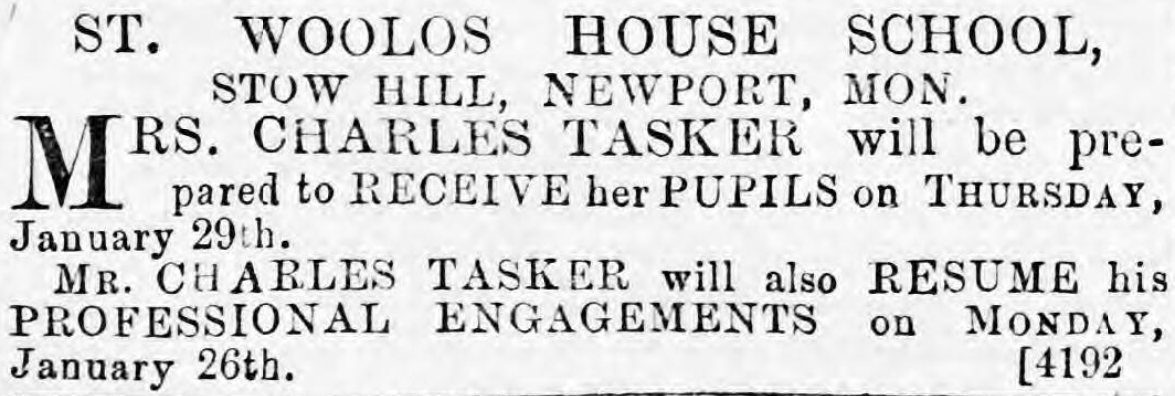

Plum Pudding Parade
POOR CHILDREN ENTERTAINED AT NEWPORT.
The twentieth annual New Year's treat for the poor children of Newport took place on Thursday in the Athletic Club Gymnasium, where about 2,400 boys and girls were served with hot dinners of roast beef and plum pudding.
The Mayor (Mr. W. M. Blackburn) headed the plum pudding parade from Messrs. Dowdall's Cooking Depot into the gymnasium. There were fourteen carving tables, each with its separate staff of stewards and helpers. The treat, which costs roughly about £200, is one of the most popular charities in the town.
At the head of it is the mayor (as president), the Rev. Harry Abraham (general hon. secretary), the Rev. E. Walrond Skinner (catering hon secretary), and Mr. J. Martin Wood (hon. treasurer). Beside the dinners, the children are given bags of oranges, apples, buns, and sweets, and an entertainment.
The cripples are looked after separately, and out of the leavings soup is made and given away.
Mr. Danter gave the children a free ride on his roundabout horses before the dinners. Miss Bassett and lady helpers had, as usual, a canteen upstairs for the army of workers.
— Evening Express, 7th January, 1910

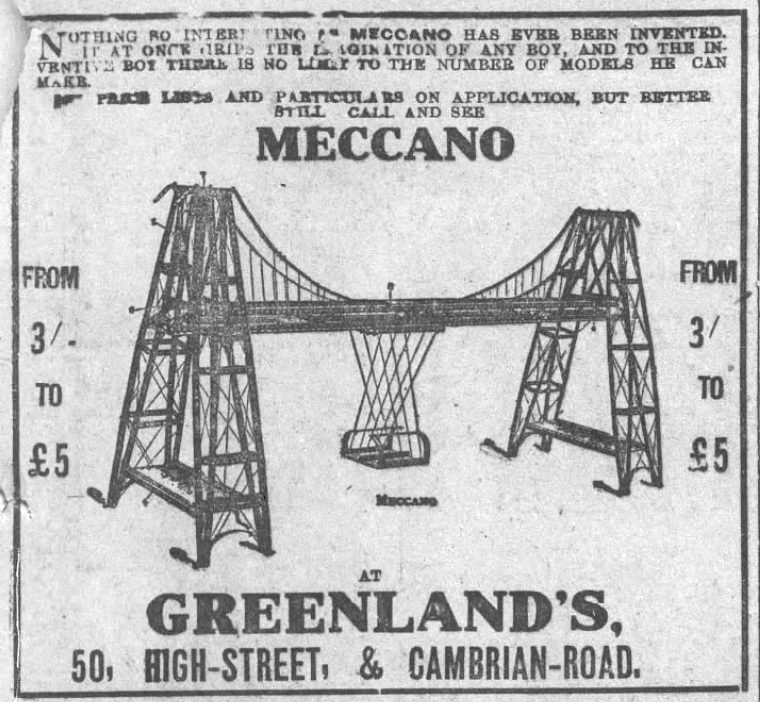

The Oldest Newport Pilot
One of the characters of this port was on Monday buried in the beautiful new cemetery near this town—good old "Tom Brown," who was the first captain commanding a steamer running between Chepstow and Bristol; was then pilot No. 1 for this port; next took command of the Severn screw steamer between this port and Bristol (holding his pilot commission meanwhile) and then, resuming his tough and worn old pilot boat, No. 1, almost "dying in harness" a few days since, nearly 80 years of age, respected by his brother pilots, and all others.
— Monmouthshire Merlin, 24th January, 1863

Strange Use of a Volunteer Drill Hall
Probably the Seventh Monmouthshire Volunteers, like many other people, will argue that they have a perfect right to do what they choose with their own. Legally, however, this argument does not always hold good and there are times, even when the law does not step in and, by a proper interference, prove it to be fallacious, that moral obligations aid a sense of what is due to decency and propriety, place a salutary check upon the adoption of measures which, according to this axiom, and without provoking any unpleasant interposition on the part of the "authorities," might be carried out to their fullest extent. But not always do motives of morality and a desire for the observance of decorum and the maintenance of respectability prevail with either individuals or bodies collective, when by exercising "the right," personal gratification or pecuniary gain can be secured. There are persons who no doubt consider these ends sufficiently important to justify any means; but, without arguins that point, we may ask what can be thought or said of those who, even without these inducements, employ "their right" so as to outrage social order and abet ruffianism?
This appears to be the position in which the Seventh Monmouthshire Volunteers have placed themselves—or some one acting as their representative has done it for them. The Drill Hall in Dock-street, the private property of the corps, has been hired by a gang of as nice a specimen of vagabondism as the town has witnessed for many a day—" respectable" members of the "P.R." profession, including "Patsy Reardon," the Brighton Doctor," and a "host of provincial and London talent"—for an exhibition of the most brutal and degrading character.

Prize fighting, notwithstanding its noble patronage, and the ingenious arguments of its promoters in its favour, is a scandal to a Christian land and between the disgrace and culpability of participating or encouraging in an actual "encounter" in the ring, and countenancing a sham "set-to" in a private building, for the purpose of showing off the "abilities" of the brutes in human form, we can discern little difference.
Therefore, as we would not insult the, humanity of the members of the Seventh by supposing they could derive pleasure from witnessing the kind of skill displayed in such an exhibition; nor willingly presume that they are so poor as to regard the paltry two pounds for which the hall was let, as an augmentation of their exchequer sufficiently large to justify them in pursuing any course rather than let it slip from their hands we cannot find any excuse for their suffering their property to be appropriated to what we must designate so disreputable a purpose.
We are informed that application was made in another quarter for the convenience required, but this was very properly refused and efforts were made by the police, pursuant to the instructions of the magistrates, on its being known that the drill hall had been secured, to prevent it being used but it was found that the law had no power over private buildings. It therefore seems that had not the Seventh obligingly conceded their premises, the town would have escaped the disgrace attaching to a mill and the redoubtable champions would have been necessitated to seek a new field in which to make a profit out of the prostitution of their physical powers.
It is a disagreeable task thus to write in respect to the doings of Volunteers but what they have done is matter of censure on the part of all the respectable portion of the community, and while no good could arise from our winking at the circumstance, possibly this public mention of the matter may prevent a like unfortunate and, at least, ill-advised step in future. At all events, if in the strictures we have thought fit to make, injustice has been done the corps—if the hall was let through any misunderstanding as to the real object for which it was required—an opportunity will be afforded of correcting any erroneous impression which may be afloat in the public mind.
For the credit of the corps, we would fain believe, either that the hall was let by some individual member without the sanction or knowledge of the officers or the corps generally, or that there was softie mistake as to the character of the persons with or on behalf of whom the engagement was made. But if the latter was the case, could not the contract have been cancelled when the truth was known?
— Monmouthshire Merlin, 31st January, 1863



'Keeping a Male Servant Without a License'
John Neck, landlord of the Dock Hotel, was summoned for keeping a male ser- vant without a license.—Mr. Hare, supervisor, appeared to prosecute. Defendant said he had a boy in his employ to do the work about the house, and he admitted that the boy helped in the stable, but was not employed for that purpose. When he took out a license he had no man and could not get one. If he had done wrong it was done in ignorance.—The case was proved, and the Magistrates inflicted the lowest mitigated penalty of £5.
— Monmouthshire Merlin, 1st November, 1872

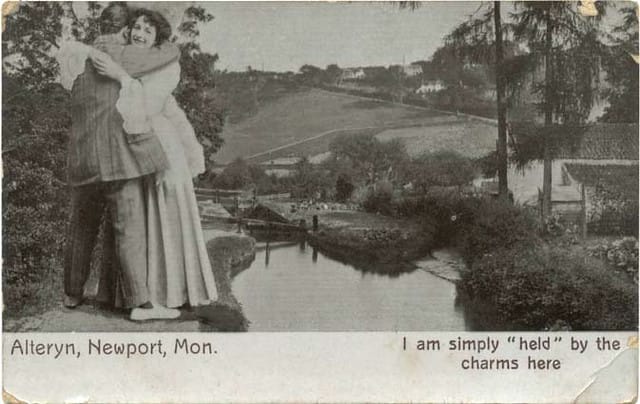

Goods on the Pavement
FIRST PROSECUTION IN 50 YEARS
Four well-known Newport tradesmen were summoned at the local Police Court, on Friday, for obstruction. The defendants were William Morgan, Clarence-place, James Spiers, Caerleon-road; Mary Ann Tuft and Harry Bartlett, each of Corporation-road.
Mr J. Moxon, who appeared for all the defendants, said they admitted a technical breach of the law, and pointed out that, though contrary to the law, the practice of displaying goods outside tradesmen's shops had been in vogue for 50 years, during which time there had been no prosecution under the Act. They did not dispute the cases, but thought the tradesmen generally should be warned of the illegality of doing this. It would be obviously unfair to penalise the defendants while permitting other tradesmen to continue the practice.
The Bench decided to dismiss the summonses, the defendants each being ordered to pay 4s. 6d. costs, and it was understood that all tradesmen should be warned not to display their goods on the public pavement.
— South Wales Argus, 18th October, 1912

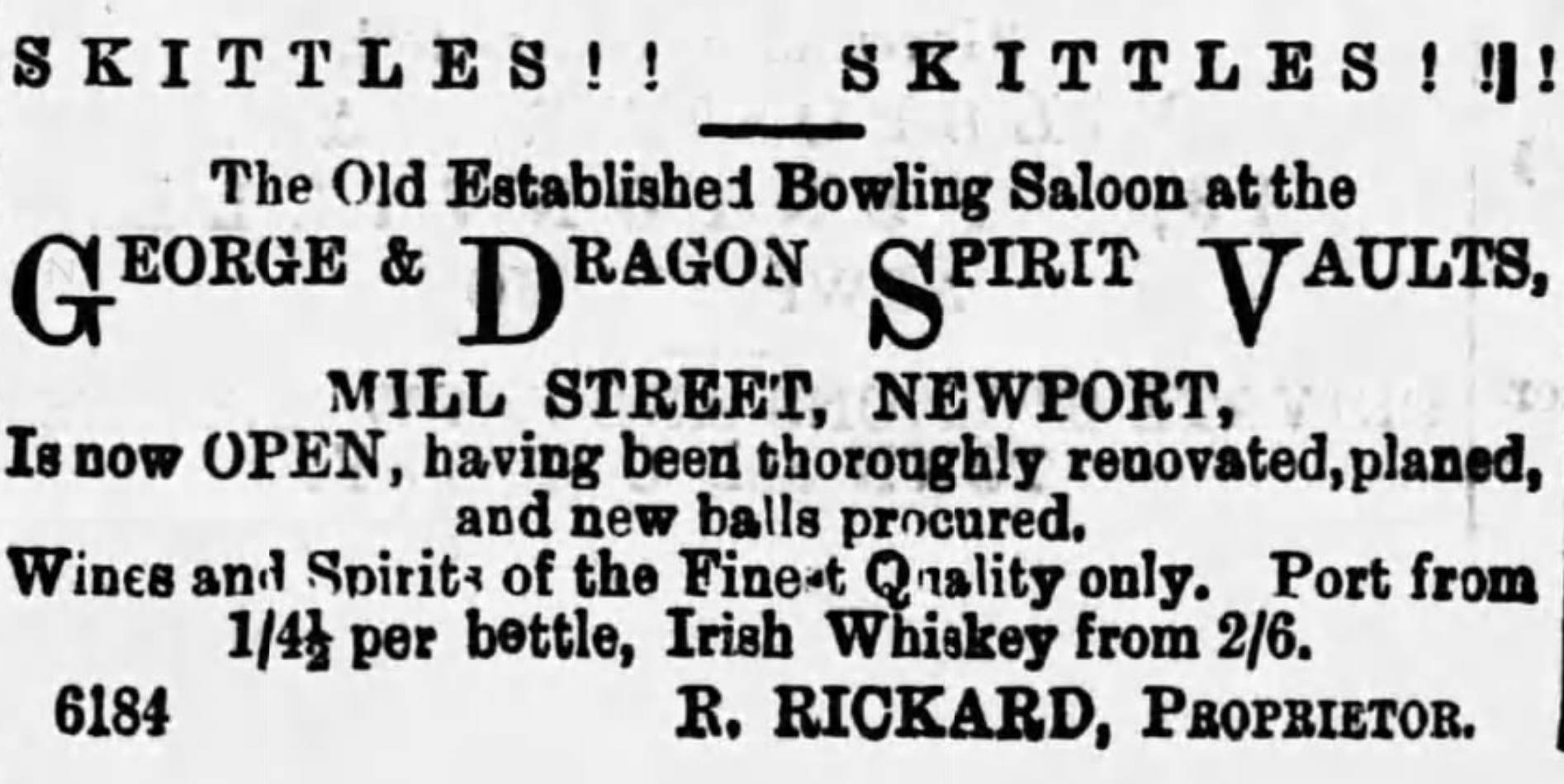

'Concentrated Aromatic Ozonising Fluid Sprayed Between Each Performance'
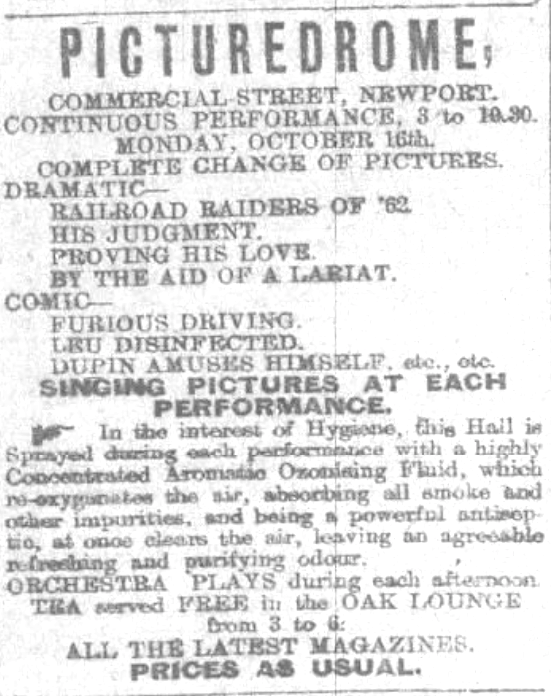

Dog Fights
We are forced to observe that dog fights are of rather frequent occurrence in our streets; and we regret that many individuals, little less brutal than the infuriated animals, seem to take a savage pleasure in these disgusting exhibitions.
A shocking scene of this description occurred on Pill-road, on Thursday se'nnight; and a great number of people had gathered around to witness it: the dogs had taken a firm hold of each other, and several persons in the crowd were humanely endeavouring to separate them, dragging and beating them violently, but to no purpose when a young gentleman, who was passing, went into a grocer's shop near at hand, procured "a pinch of snuff," and applied it to the noses of the animals. The effect was instantaneous; each dog relinquished his hold, and they both started ofl' as if electrified. This circumstance will be regarded with satisfaction by the humane, as well from the simplicity as from the effectiveness of the remedy.
— Monmouthshire Merlin, 24th March, 1849

'George Street Drain — Oozing Silently and Poisonously'
There is a small house in George-street, with a shop in front, and a back parlour—the whole so ricketty, that it shakes ominously as you walk across the floor; and beneath this fabric is a cellar, opening into the back premises,
...in which dark and noisome place the great choked-up drain of George-street has been oozing silently and poisonously for many years...
so that when this hole was at one time used as a stable, three horses died there.
The foul and pestilential den has been peeped into by Mr. Superintendent English, one of the nuisance inspectors, and we may therefore now hope that the cause of three horses' death, and who knows how many Christians' in the neighbourhood will speedily be cleansed out, and made pure and healthy.
We are glad to notice that throughout this quarter, daily evidence is being exhibited of the indefatigable perseverance of Mr. English, in the work of sanitary improvement. The only wonder is, how any man could be found alive, after the exposure to such poisonous holes, which one's health must be subject to in the work of a nuisance-finder.
— Monmouthshire Merlin, 24th March, 1849



'Best Swimmer in Newport Drowns'
William Havard, a poor man about seventy years old, who had enjoyed the reputation of being the best swimmer in Newport, imprudently went into the river opposite Mr. Powell's wharf, yesterday morning, to swim, but something being perceived to affect him, a boat was shoved off, and the old man was brought ashore a corpse. Mr. J. Harrhy, surgeon, was immediately in attendance, but without avail— the vital spark had fled.
— Monmouthshire Merlin, 19th June, 1847

The Blue Women
A neat and respectable procession of females, who, we understand, rejoice in the appellation of "Blue Women," although they did not look as if they had the "blues" on this occasion, at least, attended a place of worship on Tuesday, decorated in the various distinctions and honours of the "order."
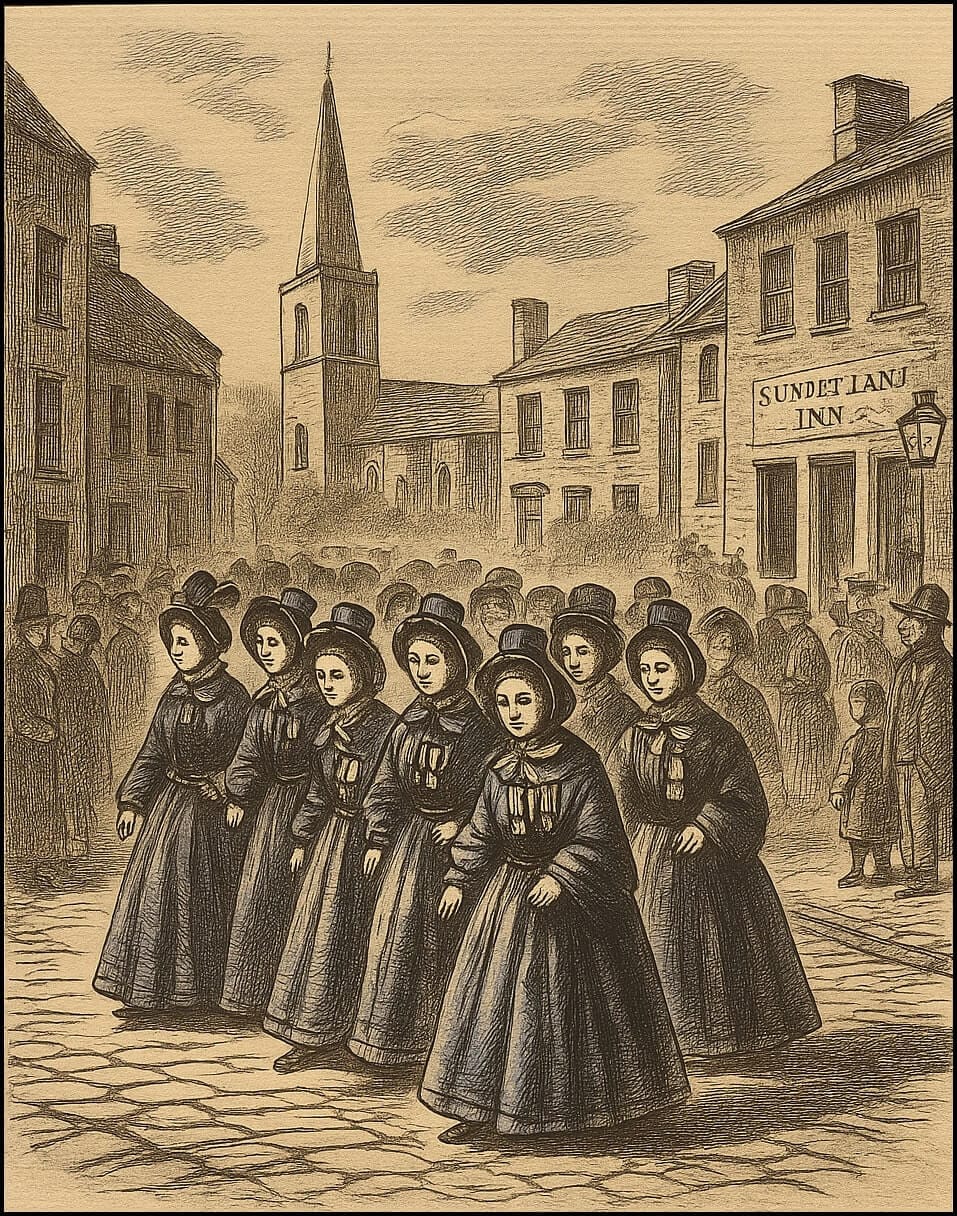
After a sufficiently public promenade of the town, they sat down to the customary annual dinner, of the right sort, in their club room at the Sunderland Inn, Llanarth-street, where they spent the evening in a decorous and happy manner. It is, doubtless, wise in the "better halfs" to assist their husbands in providing against a rainy day, though public processions do not exactly belong to females.
— Monmouthshire Merlin, 17th July, 1847
'Club of Wives and Spinsters'
On Monday last, the club of wives and spinsters, who prudently save the means while in health, to Provide for the times of sickness and death, and who meet for hat good purpose at the Market Boat Inn, Stow Hill, enjoyed heir anniversary in good style, in their club room, after hearing a good religious address, and parading the streets in their "best bib and tucker."
There is scarcely a necessity for us to add, that the "husbands and sweethearts," not a few, were in attendance at the post-prandial festivities, not only to participate therein, but also to escort their partners home at a fitting hour, as became the gallant Lotharios and Benedicts.
— Monmouthshire Merlin, 17th July, 1847

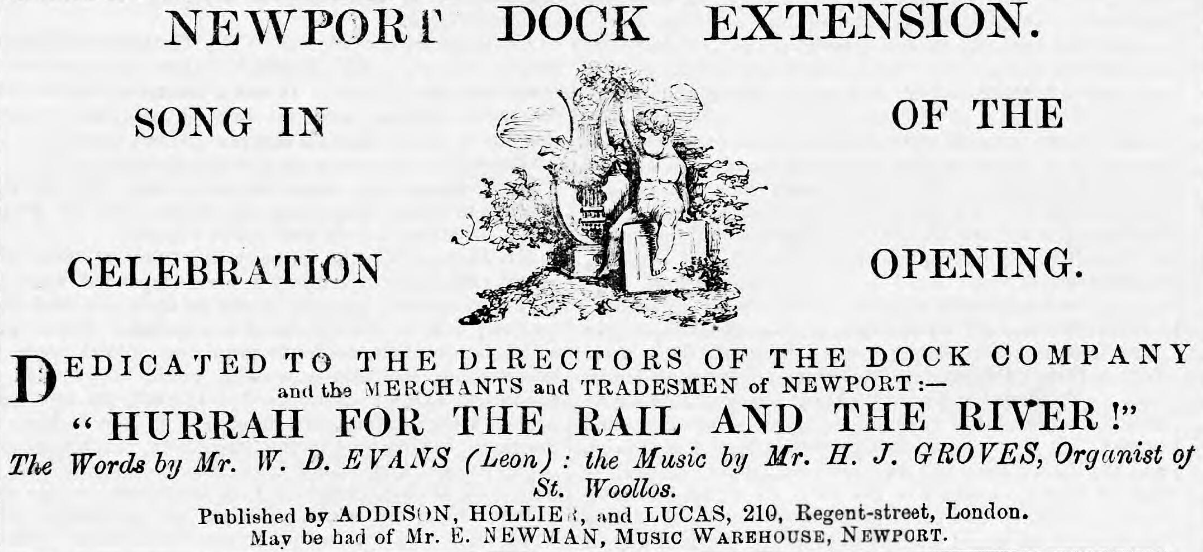

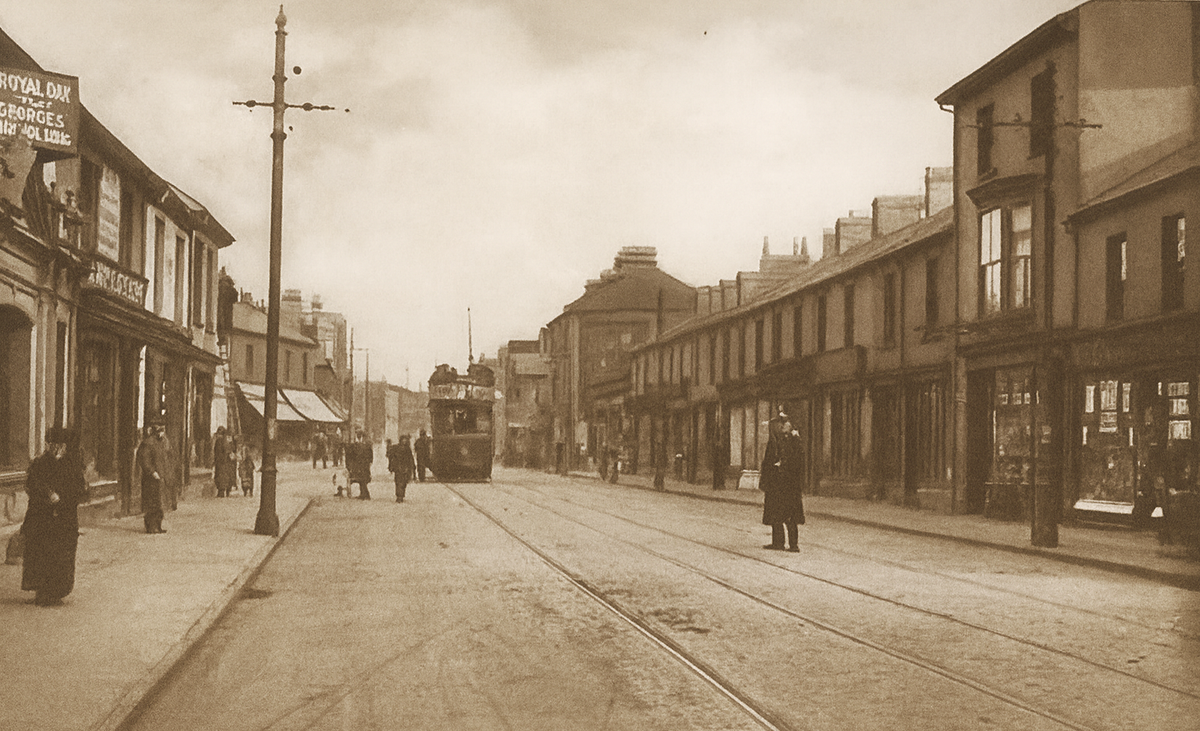
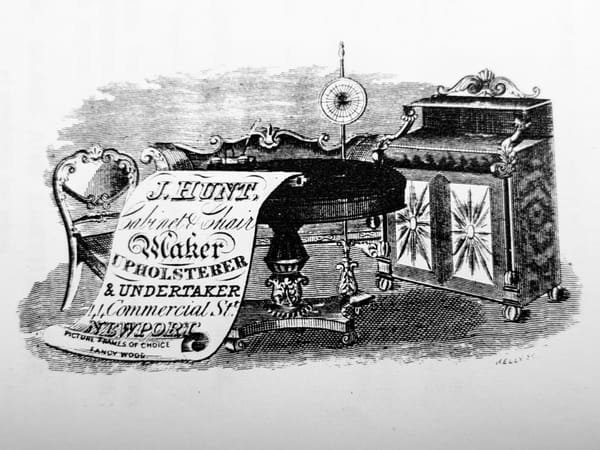
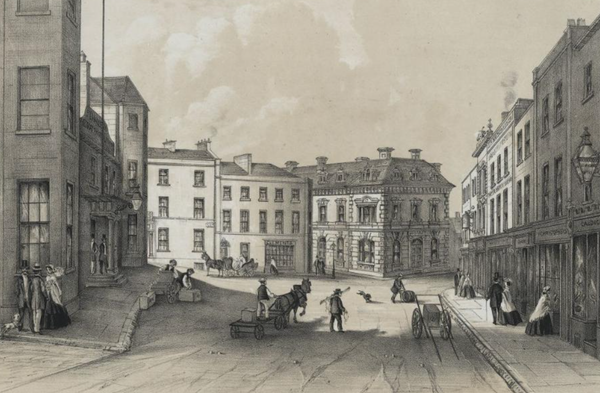
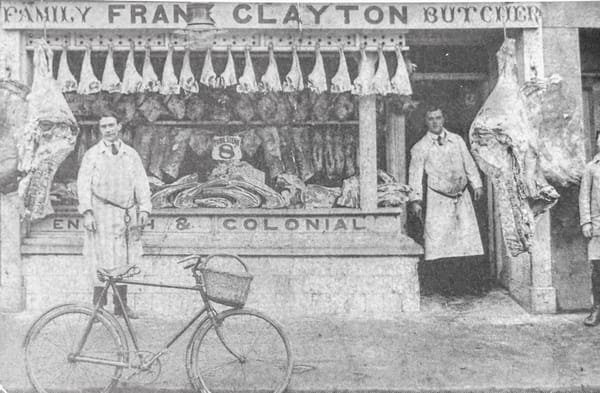
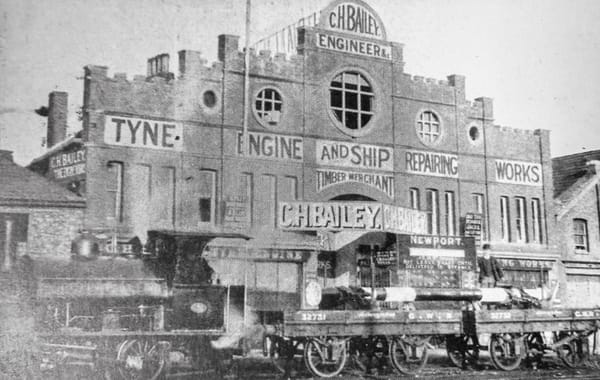

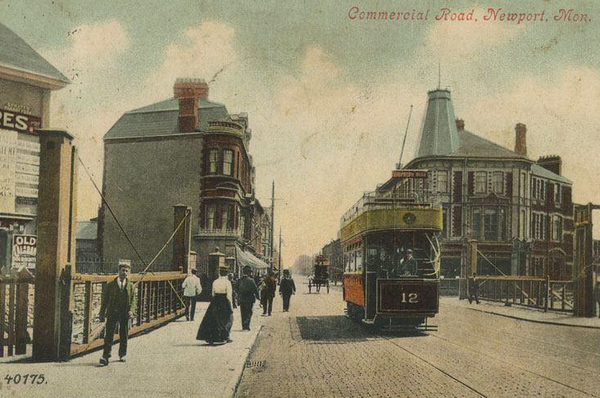
Member discussion